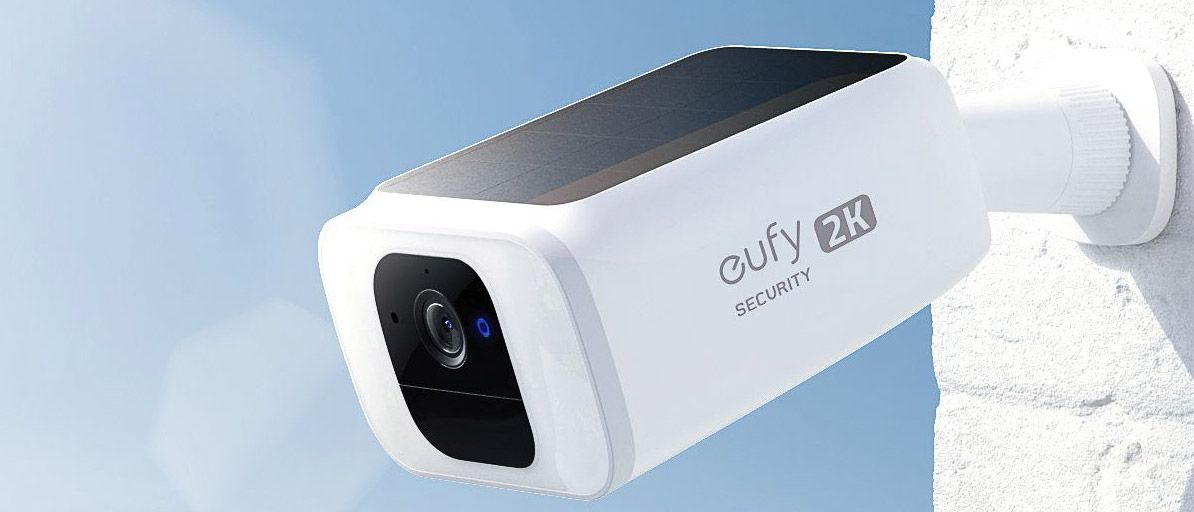TechRadar Verdict
The Eufy SoloCam S40 is a 2K battery-powered home security camera with a built-in solar panel, so you never have to worry about charging it. It captures detailed and clear footage, which is always in color thanks to the built-in spotlight. And the built-in storage for video, which does away with the need to pay subscription costs, is the real draw here. However, the camera is bulky and it lacks HomeKit support.
Pros
- +
Super-detailed video
- +
Free video storage
- +
Integrated solar panel
Cons
- -
Lacks HomeKit support
- -
Bulky
- -
Light can’t be set to illuminate for long periods
Why you can trust TechRadar
Two-minute review
Battery-powered home security cameras – which offer greater flexibility over where they can be mounted compared to mains-powered wireless cameras – have been available for a number of years. However, they regularly need to be removed for the purpose of charging, which may not be the simplest of tasks if the camera is located high up on your property.
Now, Eufy – the smart home brand for peripherals firm Anker – hopes to make life easier with the SoloCam S40. This bigger and bulkier version of the brand’s SoloCam E40 battery-powered security camera comes with an integrated solar panel, which Eufy says requires 2 hours of sunlight a day to ensure the camera doesn’t run out of charge.
As expected, the weatherproof security camera will send alerts to your smartphone when motion is detected in its 130-degree field of view, allowing you to log in to an app to view the camera’s live feed. Footage is captured in color, both during the day and at night – providing the 600 lumens floodlight is set to illuminate when motion is detected – and any activity is recorded and stored at 2K so it can be reviewed at a later date.
Alongside the built-in spotlight, there’s also a 90db siren, which can be triggered manually to deter any would-be intruders, while a built-in microphone and speaker allow you to converse with anyone in the camera’s field of view. In addition, integration with Amazon Alexa and Google Assistant means you can use a compatible smart display to review the camera’s feed and use it in home automation, too.
Where the SoloCam S40 really trumps its rivals is that you don’t need to fork out for a subscription to access past footage. Instead, 8GB of memory is built into the camera itself. According to Eufy, this can hold around 30 days of motion detection clips based on 30 detections a day, with each video lasting for 10 seconds.
In addition, the camera includes plenty of features to reduce the number of unwanted alerts it sends. On-device AI will identify whether motion has been caused by a person or another source, while activity zones ensure you’re only notified about activity in specified areas.
Just like the Eufy SoloCam E40, this home security camera doesn’t require a base station to connect to the internet. Instead, it comes with built-in Wi-Fi and can connect directly to a router.
At $198.97 / £199.99 / AU$349.99, the Eufy SoloCam S40 is the most expensive battery-powered security camera the brand sells, and despite Eufy’s reputation for making affordable devices, it costs almost as much as the Arlo Pro 4 (although the Pro 4 does require an ongoing subscription to review recorded footage). However, for those who are looking for a hassle-free option for home security, it’s worth the investment.
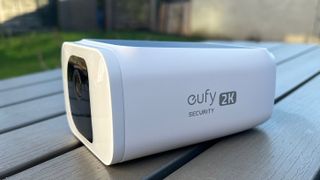
Eufy SoloCam S40 price and availability
- List price: $198.97 / £199.99 / AU$349.99
The Eufy SoloCam S40 will set you back $198.97 / £199.99 / AU$349.99, and is available worldwide through Amazon. In the US and UK, it can also be purchased directly from Eufy.
As mentioned, Eufy also offers a version without the integrated solar panel. The Eufy SoloCam E40 costs $129.99 / £119.99 / AU$229, while the Eufy SoloCam E20 – a Full HD version – comes in at a more affordable $99.99 / £99.99 (around AU$135) and is available in the US and UK.
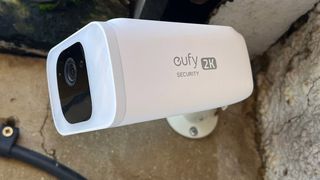
Design
- Freestanding or wall-mounted
- 8GB free built-in storage
- Bulky design
When it comes to battery-powered home security cameras, the Eufy SoloCam S40 really is a beast. Measuring 1.97 x 3.35 x 4.49 inches / 5 x 8.5 x 11.4cm (h x w x d), it’s almost twice the size of its more affordable sibling, the SoloCam E40. The camera is freestanding, allowing it to be placed on a surface, or it can be affixed to a wall using the bundled screw-in mount. We found that mounting the camera, rather than using the SoloCam S40 freestanding, allowed us to achieve a better angle for covering a wider field of view in our garden.
The camera boasts a monochrome design, with a matte white casing complemented by a glossy black fascia that houses the 130-degree camera lens. An LED illuminates blue when the camera is being charged via mains power, or if motion is detected. There’s also a microphone, so you can converse with anyone in the camera’s field of view.
A black solar panel covers most of the top of the camera, while on the rear of the unit you’ll find a USB-C charging port. You’ll also find a sync button here, used for set up, sitting beneath a silicon cover along with the mounting hole. While the solar panel is designed to be the camera’s main source of power, if it’s positioned somewhere that doesn’t get enough sunlight, the bundled USB-C cable enables manual charging. However, you’ll need to supply your own power socket.
As mentioned, the Eufy SoloCam S40 comes with 8GB of built-in storage, which can hold up to 30 days of video clips (based on 30 events a day, with each lasting 10 seconds).
Like all Eufy wireless home security cameras, the S40 is simple to set up. Just download the app onto your smartphone or tablet, and create an account. Once you’ve done this, you’ll need to press the sync button on the camera, enter your home Wi-Fi password, and use the camera’s lens to scan a QR code that will be displayed on your phone. Follow the on-screen steps to name your camera, and it’s ready to start monitoring.
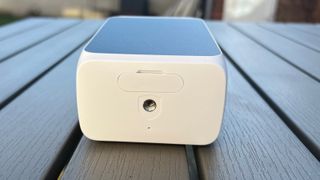
Performance
- 2K footage is clear and detailed
- Spotlight and siren deter intruders
- Free built-in video storage
We were impressed by the clarity and level of detail captured by the Eufy SoloCam S40 in its recordings. The spotlight can be set to illuminate automatically at night if motion is detected, which ensures that any video recorded both during the day and at night is in color. Footage exhibited a slight fish-eye effect, but not so much that it detracts from the detail on display.
It's possible to adjust the brightness and tone of the spotlight, moving from a warm white to a cooler, starker tone. However, we were disappointed that you could set the light to illuminate for a longer period of time, seeing it double as a way to light the outside of your home as the Arlo Pro 4 does, for example. Alongside the spotlight, there’s a 980db siren, which can be triggered manually when viewing the live feed in a bid to deter any intruders.
The built-in AI proved accurate at identifying people in the camera’s field of view, even providing a small thumbnail of the human in the Events list. We also found the two-way talk function clear.
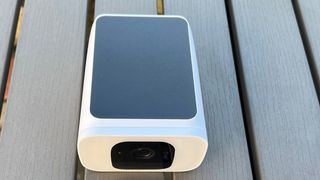
Battery life
- Solar panel charges battery for you
- Takes eight hours to fully recharge with cable
- Battery level visible in the app
The solar panel on top of the SoloCam S40 charges its built-in battery. Providing it gets at least two hours of sunlight per day, there will be no need for you to charge the battery manually. However, if the camera is mounted somewhere that doesn’t see a lot of sunlight, or if the camera is enlisted indoors, Eufy states the battery will last for up to four months (based on five minutes of recording a day) before it needs recharging. Open the app and you’ll see a clear battery level indicator, displayed as a percentage.
We put the camera through heavy testing in a short period of time for this review, but located it in a position that easily achieved two hours of sunlight a day. The result was that our camera didn’t require charging manually at all during this time. However, battery life will depend on how often motion is detected, how many times the live feed is viewed, if the siren is triggered, and the number of times the two-way microphone and speaker are engaged.
Using the charging cable, it will take eight hours to fully charge the S40’s battery.
The SoloCam S40 also comes with a handy Power Manager feature that allows you to prioritize battery life by reducing the length of captured footage and the frequency of motion detection.
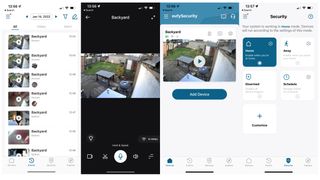
App
- Easy to navigate
- Integration with Amazon Alexa and Google Assistant
- Create a recording schedule
When it comes to controlling and viewing the footage captured by the S40, you’ll need the Eufy Security app, which is compatible with a range of other Eufy home security cameras. Upon launch, a list of Eufy security cameras installed in your home will be displayed, along with a snapshot of the most recent motion detection.
Tapping the snapshot will let you view the camera’s live feed, or you can use the quick actions above the image to snooze notifications for a set period. You can also gain access to the footage of the most recent motion detections in chronological order (you can also do this from the Events tab at the bottom), and tweak the most common settings for each camera. These may include creating activity zones, so you only receive notifications about motion in these specific areas, thereby reducing unwanted alerts. Meanwhile, the Security tab located at the bottom of the screen allows you to arm or disarm some or all of your Eufy cameras at the same time, adjusting how they behave or enabling you to create a schedule.
The SoloCam S40 offers integration with Amazon Alexa and Google, allowing you to view its live feed on one of the best smart displays. Unfortunately, unlike Eufy’s other cameras, the S40 camera doesn’t come with support for HomeKit.
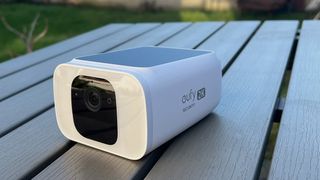
Should I buy the Eufy SoloCam S40?
Buy it if...
You don’t want to worry about recharging batteries
The solar panel on this security camera takes care of charging the unit. No longer will you have to keep an eye on the power level and go to the hassle of removing the camera and recharging it yourself.
You want super-detailed video
The Eufy SoloCam S40 captures footage in 2K, which means you can mount the camera high up to cover a wide area without losing detail in the video.
You want subscription-free storage
Thanks to the 8GB of built-in memory, there’s no need to fork out for a subscription that stores footage recorded by the camera in a secure area online.
Don't buy it if...
You’re on a budget
At $198.97 / £199.99 / AU$349.99, this is the most expensive battery-powered home security camera Eufy sells, and should be avoided by those on a budget.
You want to use it indoors
While the SoloCam S40 can be used indoors, it’s primarily designed for use outdoors; the lack of a freestanding mount means the angle the lens covers can’t easily be adjusted. If you’re looking for a unit to use inside your home, consider one of Eufy’s wired models that are supplied with a stand that ensures you can angle the camera to cover the area you want.
You want a camera that doubles as an exterior light
While the S40 has a built-in 600 lumens light, it can’t be set to come on for longer periods as a way to illuminate the exterior of your property. Instead, it either triggers when motion is detected in the same way as a sensor light, or it can be manually controlled in the app.
First reviewed: January 2022
- Check out these great home security camera deals
Carrie-Ann Skinner was formerly Homes Editor at TechRadar, and has more than two decades of experience in both online and print journalism, with 13 years of that spent covering all-things tech. Carrie specializes in smart home devices such as smart plugs and smart lights, as well as large and small appliances including vacuum cleaners, air fryers, stand mixers, and coffee machines. Carrie is now a copy editor at PWC.
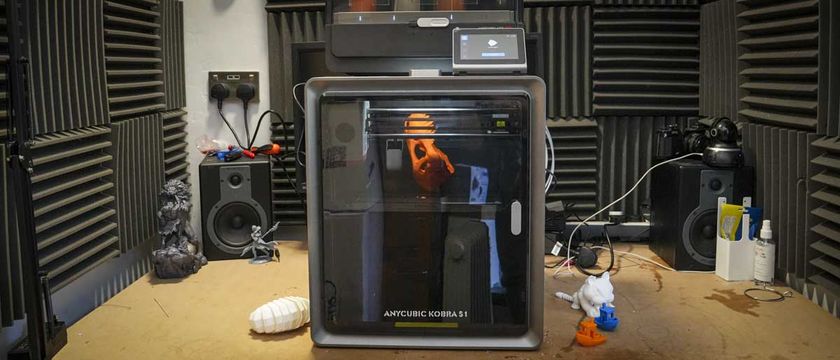
After testing the Anycubic Kobra S1 for a month, this is the machine I would recommend as a first for multifilament printing

India vs New Zealand live stream: Watch ICC Champions Trophy online (it's free)
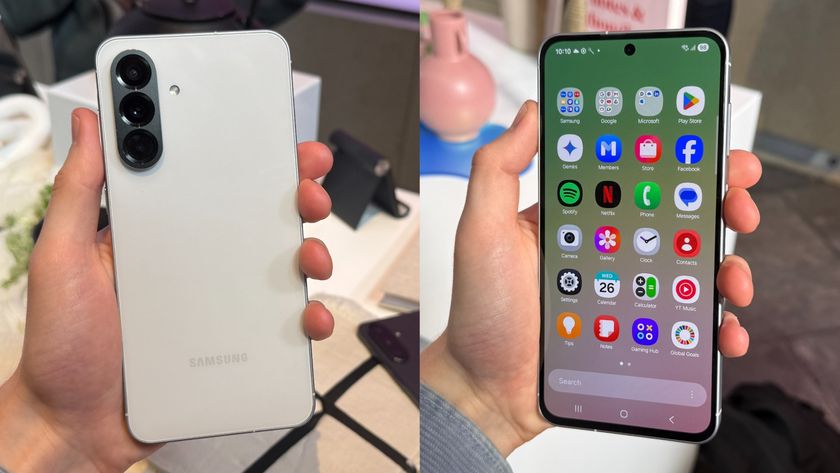
I went hands-on with the Samsung Galaxy A56, and it might just be better value than the Galaxy S25
Most Popular






